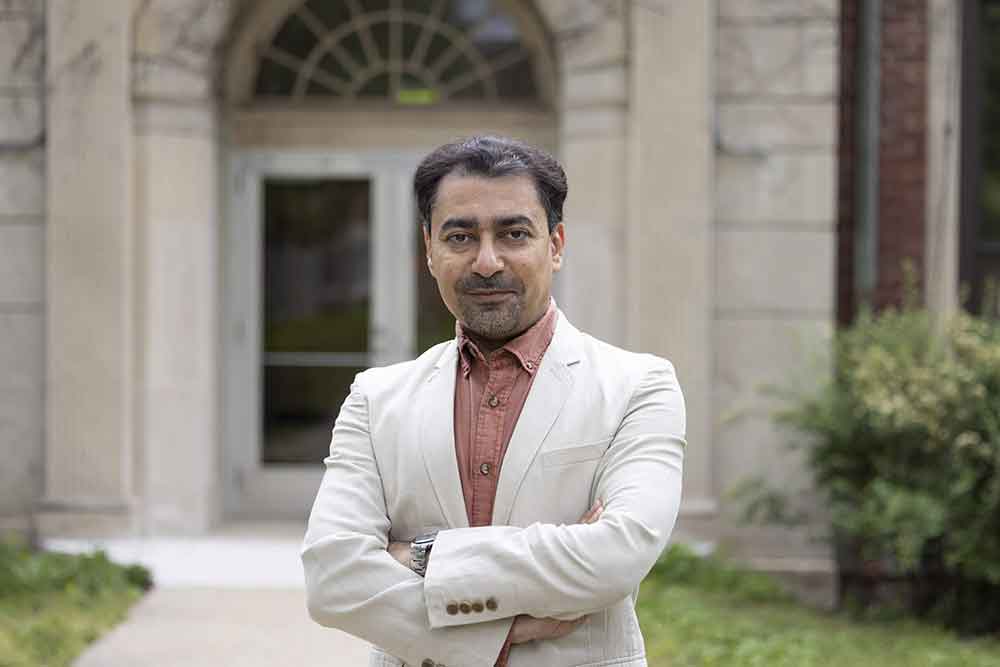USDA Awards NIU $650K For Biomass Pipeline Feasibility Study
Northern Illinois University (NIU) professor Mahdi Vaezi is investigating the feasibility of constructing an innovative, first-of-its-kind biomass pipeline. The research project, supported by a $650,000 award over four years to NIU from the U.S. Department of Agriculture, could lay the groundwork for the world’s first biomass pipeline in the state of Maine, says Vaezi, a professor of Engineering Technology.
“Much of the world is dependent on fossil fuels, and everyone is looking for replacement options,” Vaezi explains. “Yet we have vast sources of biomass that are wasted or underutilized.”
Vaezi first studied the feasibility of a biomass pipeline for his dissertation nearly a decade ago at the University of Alberta in Canada. For the new project, he’ll have considerably more resources at his disposal.
The USDA grant will be used in part to purchase roughly $100,000 in instruments and equipment for a new Waste Advanced Solution Technologies and Ecosystems Laboratory (WASTE Lab), where a 30-ft., closed circuit prototype pipeline will be assembled in coming months. NIU’s Department of Engineering Technology, College of Engineering and Engineering Technology and Division of Research and Innovation Partnerships (RIPS) are supporting the laboratory development as well.
RIPS also helped Vaezi find industry and scientific partners for the project. Collaborators on the grant are Dr. Parisa Mirbod (the Mirbod Lab) at the University of Illinois at Chicago (UIC) and Biofine Developments Northeast Inc., a biomass user and biorefinery. Mirbod and her group at UIC will investigate the phenomena behind plug flow formation and drag reduction effect in the flow of fibrous biomass particles slurries in pipes and pumps using flow visualization techniques such as particle image velocimetry (PIV).
“This is a great example of a research collaboration that connects a faculty expert with innovators, entrepreneurs, industry and students,” says Gerald Blazey, vice president of RIPS. “We’re happy to help support this important research.”

Engineering Technology Professor Mahdi Vaezi
In consultation with the Construction Management Institute of Maine, the project will include a case study of the techno-economy of large-scale and long-distance biomass pipelines, for a potential 10-mi. long woodchips pipeline to supply a commercial port in Eastport, Me. The woodchips would be pipelined in a slurry (a mixture with water) to the port and shipped to Europe.
The high cost of transporting biomass feedstock, most often by truck, has been a major barrier toward increasing the scale of biomass-based energy facilities. The current study will include technological and economic analyses to compare the pipeline hydro-transport of biomass with truck, train and ship transportation in short, medium and long distances.
An added benefit of a pipeline system is that the biomass slurry can be heated to destroy contaminants or infestation that may be subject of biomass shipping regulations, Vaezi adds. Once delivered, biomass could be screened to recycle water and moved to an open space, where it could be naturally or mechanically air dried at little to no cost.
In addition to wood chips, the NIU team will study the economic and mechanical feasibility of pumping sawdust and wheat straw water mixtures via pipeline.
“Biomass feedstock provides energy security,” Vaezi says. “It’s the only type of renewable energy that can be directly converted into biofuel. We anticipate this novel work will introduce pipeline as a technically feasible and economically viable mode of delivery to transport biomass feedstock in large scales and over long distances at costs noticeably lower than other modes of delivery, such as truck, train and ship. This will make biomass-based energy facilities scale- and economy-wise competitive with fossil fuel-based plants.”
Latest news
Fecon Hires Ray Dalton As Vice President Of Aftermarket Sales
Fecon, a global manufacturer of heavy-duty site preparation attachments and forestry accessories, announces Ray Dalton as the new vice president of aftermarket sales. In this newly created role, Dalton will focus on growing the company’s successful aftermarket business while also developing new solutions and products based on customer and dealer input…
SunGas Renewables Chooses Louisiana For Proposed Facility
SunGas Renewables, an independent division of GTI Energy, announced it is considering an investment of approximately $1.8 billion to establish a renewable low-carbon methanol production facility in Pineville, Louisiana. The company projects its facility, Beaver Lake Renewable Energy (BLRE), would manufacture nearly 400,000 metric tons of green methanol per year for SunGas customers worldwide…
Polytechnik, Andritz Among Suppliers For Europe’s Largest Industrial Torrefaction Plant
Finnish company Joensuu Biocoal Oy intends to produce renewable alternatives to fossil coal with a pioneering project that demonstrates a potential solution to the industrial push towards carbon neutrality, helping to reduce the environmental impact caused by fossil fuels while providing a renewable energy source…
Sugimat To Supply Biomass Steam Boiler For Olive Extractor
Olive marc extractor company Casa Alta–Sociedade Transformadora De Bagaços, LDA, has selected Sugimat for a new biomass-powered steam boiler and hot gas generator furnace for its productive process. Both machines will be fed with olive cake, a biomass product of the plant itself…
Musser Plans More Byproducts
Musser Biomass and Wood Products, a division of family-owned and operated Musser Lumber Co., will invest $7.5 million and create 10 new jobs to expand its operation at Rural Retreat, Va. The expansion will more than double production of dried hardwood chips and sawdust the…
Find Us On Social
Subscribe to Our Newsletter
Wood Bioenergy News Online hits the inboxes of subscribers in the wood-to-energy sectors.
Subscribe/Renew
Wood Bioenergy is published and delivered worldwide 6 times per year. Free to qualified readers in the U.S. Subscribers outside the U.S. are asked to pay a small fee.
Advertise
Complete the online form so we can direct you to the appropriate Sales Representative.
